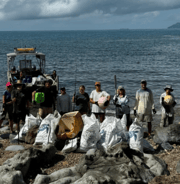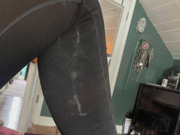Aussies have been taking days off at an alarming rate. What does this mean for seniors?
By
Danielle F.
- Replies 0
As the winter chill sets in across Australia, many Aussies brace for temperatures taking a nosedive.
Have you noticed your friends, family, or even yourself getting sick lately?
You're not alone, and here's a possible reason why.
Australia is bracing for what experts are calling a 'nasty' flu season.
On top of the flu, a new COVID-19 subvariant has been silently making rounds.
So, what's going on, and what does it mean for seniors?
According to data from telehealth sick note provider Sicky, Aussies have been calling in sick at much higher rates than last year.
Between March and April this year, flu-related sick leave requests more than doubled at 108 per cent year-on-year.
Meanwhile, COVID-related sick leave requests have jumped by 24 per cent.
Even travel-related illnesses are on the rise, with an 11 per cent increase in sick certificate requests.
Why the spike?
According to Sicky's co-founder, Avinash Vazirani, it's a combination of factors.
'Travel is back in full swing, which is great news for the soul, but it also comes with a few risks,' the pharmacist explained.
Airplanes, with their recirculated air and shared surfaces, are a breeding ground for viruses.
The new COVID-19 subvariant
You might have heard whispers about the COVID-19 subvariant, NB. 1.8.1.
While Sicky does not track the exact COVID-19 strain people have, the World Health Organisation has been monitoring the said variant.
Since its emergence last January, it has become the dominant strain in areas like Hong Kong and China.
Recent wastewater testing suggested that this variant accounts for 40 per cent of COVID-19 cases in Victoria and 50 per cent of cases in Western Australia.
Health authorities have urged everyone, especially seniors, to get their booster shots.
Health Minister Mark Butler emphasised that new variants keep emerging, and staying up to date with vaccinations is your best defence.
'The best way to protect yourself and your family is to get the newest booster, which provides excellent coverage, is safe, and will reduce the severity of your symptoms if you contract COVID-19,' Dr Paul Griffin, director of infectious diseases at Mater Health in Brisbane, stated.
It's not just COVID making the rounds. The flu is back with a vengeance.
In the first three months of 2025, there have been 48,586 lab-confirmed cases of influenza.
This was a massive jump from 30,492 cases recorded during the same period last year.
Griffith University virologist Associate Professor Lara Herrero described this flu season as 'nasty' and has urged everyone to get their annual flu jab.
Hospitals are feeling the pressure, too.
In Victoria, Western Health recently reintroduced mask mandates for all staff in patient-facing areas.
They also limit visitors to two people per patient for up to two hours daily.
These changes are expected to manage increased transmission of influenza, COVID-19, RSV, and even measles.
Travel precautions are not just for the paranoid
If you're planning a trip—whether it's to see the grandkids or to escape the winter blues—Vazirani has a few precautions:
How can you stay healthy at home?
Here are some steps to help you stay well this winter:

Have you noticed more people getting sick lately? Have you had trouble visiting loved ones in the hospital recently, or are you taking extra precautions when travelling? We would love to hear your experiences this winter. Share them with us in the comments section below.
Have you noticed your friends, family, or even yourself getting sick lately?
You're not alone, and here's a possible reason why.
Australia is bracing for what experts are calling a 'nasty' flu season.
On top of the flu, a new COVID-19 subvariant has been silently making rounds.
So, what's going on, and what does it mean for seniors?
According to data from telehealth sick note provider Sicky, Aussies have been calling in sick at much higher rates than last year.
Between March and April this year, flu-related sick leave requests more than doubled at 108 per cent year-on-year.
Meanwhile, COVID-related sick leave requests have jumped by 24 per cent.
Even travel-related illnesses are on the rise, with an 11 per cent increase in sick certificate requests.
Why the spike?
According to Sicky's co-founder, Avinash Vazirani, it's a combination of factors.
'Travel is back in full swing, which is great news for the soul, but it also comes with a few risks,' the pharmacist explained.
Airplanes, with their recirculated air and shared surfaces, are a breeding ground for viruses.
The new COVID-19 subvariant
You might have heard whispers about the COVID-19 subvariant, NB. 1.8.1.
While Sicky does not track the exact COVID-19 strain people have, the World Health Organisation has been monitoring the said variant.
Since its emergence last January, it has become the dominant strain in areas like Hong Kong and China.
Recent wastewater testing suggested that this variant accounts for 40 per cent of COVID-19 cases in Victoria and 50 per cent of cases in Western Australia.
Health authorities have urged everyone, especially seniors, to get their booster shots.
Health Minister Mark Butler emphasised that new variants keep emerging, and staying up to date with vaccinations is your best defence.
'The best way to protect yourself and your family is to get the newest booster, which provides excellent coverage, is safe, and will reduce the severity of your symptoms if you contract COVID-19,' Dr Paul Griffin, director of infectious diseases at Mater Health in Brisbane, stated.
It's not just COVID making the rounds. The flu is back with a vengeance.
In the first three months of 2025, there have been 48,586 lab-confirmed cases of influenza.
This was a massive jump from 30,492 cases recorded during the same period last year.
Griffith University virologist Associate Professor Lara Herrero described this flu season as 'nasty' and has urged everyone to get their annual flu jab.
Hospitals are feeling the pressure, too.
In Victoria, Western Health recently reintroduced mask mandates for all staff in patient-facing areas.
They also limit visitors to two people per patient for up to two hours daily.
These changes are expected to manage increased transmission of influenza, COVID-19, RSV, and even measles.
Travel precautions are not just for the paranoid
If you're planning a trip—whether it's to see the grandkids or to escape the winter blues—Vazirani has a few precautions:
- Wear a well-fitted mask during flights, especially when not eating or drinking.
- Sanitise your hands regularly, particularly after touching common surfaces or using the loo.
- Avoid touching your face.
How can you stay healthy at home?
Here are some steps to help you stay well this winter:
- Practice good hygiene: Wash your hands regularly, use hand sanitiser, and avoid touching your face.
- Wear a mask in crowded places: This works as a protective layer, especially in hospitals, on public transport, or when travelling.
- Stay home if you're unwell: Protect others by resting up and avoiding public places if you have symptoms.
- Keep up healthy habits: Eat well, stay active, and get plenty of sleep to keep your immune system strong.
- Get vaccinated: Make sure you're up to date with both your COVID booster and your annual flu shot.
Key Takeaways
- Sick leaves have surged across Australia, with a 108 per cent rise in flu-related and a 24 per cent rise in COVID-related requests reported by a telehealth provider.
- Travel has contributed to increased illness, with experts warning that confined spaces like planes are 'perfect' grounds for spreading COVID-19 and flu.
- The NB. 1.8.1 COVID variant, now dominant in parts of Australia, has led to calls from health officials for people to get the latest booster jabs as infections and hospitalisations climb.
- Hospitals in Victoria have reintroduced visitor restrictions and mask rules for staff due to rising cases of influenza, COVID, RSV and measles, with experts urging everyone to get their annual vaccine.








